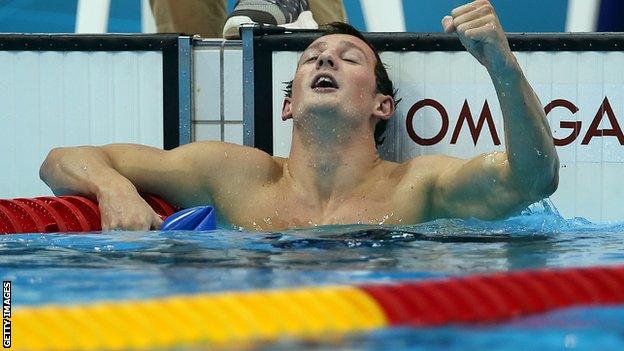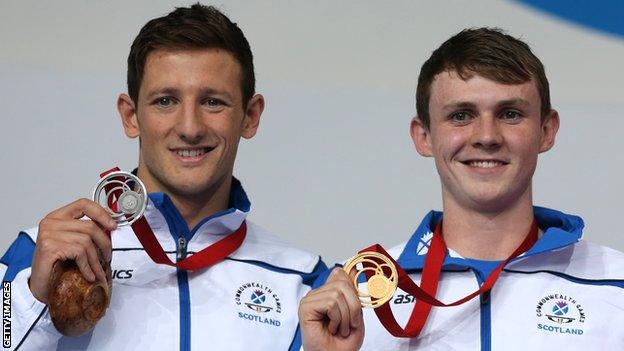Michael Jamieson: From the Olympic podium to depths of depression and finding closure
- Published

Michael Jamieson after his silver medal swim at London 2012
There's a boy by the pool in Glasgow, staring into the water but unwilling to jump. Too cold in there, too manky. Shivering, his toes frozen on the rusty tiles, but still happier to be out than in.
He returns to his father's car. "No good?" "No." "You might do it next week..." "Maybe." Six weeks passed before young Michael Jamieson got wet. "My earliest swimming memory," he says.
There's a man at the pool in London, in the water but not feeling it. He's an Olympic silver medallist, beaten only by one of the greats who had to break the world record to see him off. It had been three years since he'd gone for a proper swim.
"I just wanted to jump in to see how it felt. Ten minutes was enough to remind me that that door is closed and I won't be reopening it again," Jamieson says.
The years in between tell a tale of a great talent with a dangerous obsession, of the highs never quite being high enough and the lows being terrifyingly low.
In the summer of 2012, at the London Olympics, Jamieson did what the band of swimmers from these shores will attempt to do in Tokyo in the coming days, but his journey to that point, and the mesmeric way he tells it, is the stuff of fairy tale and horror story in equal measure.
'The shower cubicle was also the wardrobe'
Paris. The mention of the city makes him laugh. He went there as a teenager hell bent on working with renowned coach Fred Vergnoux. The only funding he had was from his family, his mum and dad working double time to back the dream.
"I stayed in a studio apartment the size of a box toilet. My wingspan could touch either wall. I had a single pull-out bed which doubled up as a one-and-a-half man sofa. The shower cubicle was also the wardrobe.
"Whenever I needed a shower I had to unload all the clothes and make sure the shower was dry before I put my clothes back or else I'd have been going around stinking of damp. I was absolutely skint, but I had some of my fondest memories. A real character-building period."
That life lasted 18 months. He befriended Ricky Barbosa; a swimming star with the life to match. He had such luxuries as food and proper shelter. He lived in a large apartment overlooking Notre Dame.
Once a month, Jamieson would stay and then leave with two bags of finest butchers' meat. "The apartment was owned by a professional poker player and as soon as he heard the Glaswegian accent he didn't like me being around the building. I think he thought I was going to walk off with one of his sofas or something."
Jamieson was good, everybody could see it. What nobody could see was what was going on inside his head - "the voices", the scary focus on getting to the top that went beyond what passes for the norm in this frighteningly competitive world.
In 2007, he knew that what he originally thought were mood swings were something darker. Subdued emotions, internal angst, frustration that he wasn't getting to where he wanted to go. He parked it, but that stuff doesn't take long to rev up again.
"The blinkers were on. I was just consumed by the journey where I thought this end point will make it all worth it. I just have to keep my head down and keep grafting. Things don't really work like that, do they?
"You've got to build perspective, you've got to build an appreciation for the various processes that are involved in your own personal development and I just switched off to a lot of that."
He says he had an addiction to training and by training he means an addiction to pushing his body too far.
"I just didn't have an off button. I wasn't able to throttle back to 85-90% effort because I couldn't justify everything happening around me - the commitment family and friends were making, the commitment I was making. I felt I couldn't justify that unless I was going full tilt and just trying to bury myself at every opportunity.
"This thing about athletes showing the world they are training on Christmas Day - everyone does that, that's not enough. What else are you doing? I always used to ask myself that, that there's got to be more, find more."
'They gave me a little jolt with a defibrillator'
All of that was building to the final of the 200m breaststroke at London 2012. In every other race, there was noise in his head, there were tactical and technical things to think about, but in London there was none of that. There was a serenity.
He walked through the sliding doors to the pool and he just smiled and thought, 'this is it...' The boy who didn't want to get wet, the teenager with his clothes in the shower, the meat parcels in Paris, the stress that nobody saw - it was all leading to this moment.
"I knew there was nothing else I could have done and that caused a bit of quiet in my head and for those few minutes I thought, 'I've earned this, I really have earned this'."
The final was about him and the Hungarian Daniel Gyurta, the three-time world champion. Jamieson in lane four, Gyurta in lane five. Jamieson swam the fourth fastest time in history and finished second. Gyurta broke the world record and won - 2:07.28 versus 2:07.43. Fifteen hundredths of a second in the difference.
"It was the best performance in my career and I was beaten by a guy that dominated the sport. Having the bottle to stand up in that sort of pressure cooker and deliver your best is something I can openly say I'm proud of and it's taken a lot of years to be able to say that."
To Jamieson, this was going to be the start of something special. He wanted golds and world records. He wanted dominance and he was prepared to do whatever it took to get him there.
He tells a story from the year after the Olympics. "We were doing a sort of maximum effort lactate session on this savage piece of equipment called the versaclimber, so arms and legs going at the same time.
"My maximum heart rate was 191 beats per minute and I can see on the screen that it's 189, it's 190, it's 191. I'm closing my eyes and giving it everything to get a new maximum value and then just suddenly I felt like someone had squeezed my heart really, really tightly for two or three seconds and then released it again.
"I looked up to the screen and the values I'm seeing are like 230, then 140, it was jumping all over the place so I come down off the machine and my vision's starting to go blurry. I'm pretty unsteady on my feet and then the pins and needles and numbness started to come.
"I could feel my heartbeat in my fingertips. I was taken up to the doctor straight away. I had arrhythmia - an irregular heartbeat. Down to A&E. I'm on the bed in the cardiac ward and there's been a dreadful crash on the motorway and there's people being rushed through for lifesaving surgery. I'm in amongst it.
"I was in the shape of my life three hours ago. They give me a little jolt with a defibrillator to reset my heartbeat and within 48 hours I was back in the pool."
Part of him was scared by the experience, part of him - the sadistic part - was intrigued.
"There was a pride that I'd managed to go beyond what I was physiologically capable of. It was like I'd been able to beat my body, but obviously that raised some red flags in itself."
The endgame was building, even though he was fighting it the whole time. He tore a tendon in his bicep, then had a bulging disc in his lower back, an injury caused when bending down to hoover under his bed.
There was anger and frustration because in the pool he'd been magnificent, faster than in London, a gold medal prospect for the upcoming world championships.
"There was four or five occasions where I was around that 2:07, 2:08 mark for the 200m breaststroke and within half a second or so of the world record, but it wasn't enough for me.
"It really is quite incredible looking back on the position I was in then. At times I was number one in the world - that is literally what I dreamed of as a kid - and I was there and got no satisfaction from it."
'I was consumed with my identity as an athlete'
Around the end of 2013, it started to get pretty bleak. He started to have a recurring dream about walking off the edge of a building.
"I was deeply unhappy with my performances and, at the time, I didn't really have much else. I was so consumed with my identity as an athlete.
"Every training session became a monumental battle. It was just getting too much and the respite from that was taking sleeping pills and just sort of trying to knock myself out for a while, to turn the noise down a little bit and just escape.
"Those recurring dreams were so vivid. I think that's when I was at the point when I was really convinced that it wasn't a good idea for me to be around anymore."
Questions in his head: Why am I here? How am I helping people around me? He didn't have the answers. His life was the lane of a swimming pool and the inside of a gym. A small world. And now that world was crumbling.
He had money in the bank and started thinking about who to leave it to.
"When you're considering potential ways out, it wasn't even that big a deal I was thinking that way. It was just part of a list of considerations before...I can't even bring myself to say it anymore... but before whatever I thought I was going to do was actioned."

Jamieson had to settle for silver again at Glasgow 2014, beaten by fellow Scot Ross Murdoch
Into 2014 and the Commonwealth Games in his hometown. He's the poster boy, Scotland's star turn. But he's hurting. Nobody knows it, but he's a beaten man long before he sees water.
"I remember coming out of the pool after the heats and it was way too hard. The effort that I put in for the time that I swam, it just didn't add up. I felt like a limp racehorse being taken out the back of the stables.
"I knew I wasn't fit. That internal battle is going back and forth. There's still part of you thinking, 'I can do this, I can pull this off', but I just couldn't get on top of it.
"In the call room before the final [the 200m breaststroke won by Ross Murdoch] we have this sort of powdered caffeine that you take and it's effectively like taking five espresso shots and you feel a bit jumped up and ready to go.
"I used to take that and have my music on and be super-pumped up and excited to race. But I didn't take the caffeine, I didn't have my music on. I remember walking out and hearing the crowd and almost apologising to everyone in my head, thinking this is only going one way here. Ross had an absolute world-class race that night."
Looking back, he says his career ended in that call-room at Tollcross. The following year was a write-off. He went for the trials for the 2016 Olympics, but he knew it was over.
"The only reason I went was because I wanted to face my demons. I wanted to have that closure right in my face. I knew I was going to be well beaten. I needed to see that it was done. It's time to give up, it's time to move on."
Happier, healthier but back where he started
He did yoga and meditation retreats in the jungle of Nicaragua, he ventured around Central and South America in a bid to chill out and change the view he had of himself.
He returned to London to work with talented young athletes and his performance centre is growing. He set up a swim school business and that, too, is a burgeoning project with 1,000 kids a week signed up in Glasgow with plans for expansion into Edinburgh. He has an involvement with Nike clothing.
Three strands to his new life. "A varied plate" as he calls it.
And he's happy. Much happier than when he was whirring around the vicious circle, striving madly to get to a place that was just a mirage.
Four years ago in Rio he was a hugely impressive member of the BBC commentary team, but his work life is a little busy this time around.
He'll be watching the swimming at home on television. Hooked, like the rest of us, but with a whole lot more understanding of what the Duncan Scotts and the Kathleen Dawsons and their fellow members of Team GB have had to sacrifice to get there.
He's laughing now at his 10-minutes back in the water and the memory of his six-year-old self, the boy who didn't want to get wet.
"It's come full circle. Funny, isn't it?"
